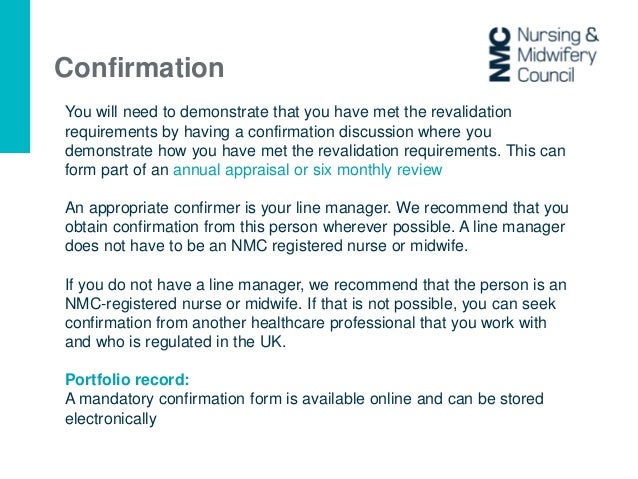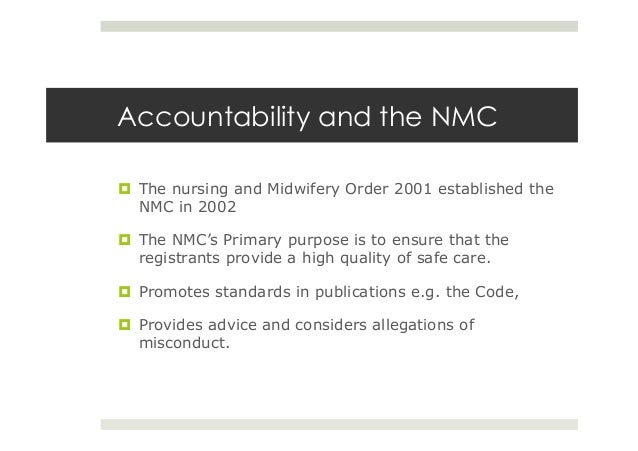What is the NMC code for nursing? Do nurses have to consent to treatment? The Code presents the professional standards that nurses, midwives and nursing associates must uphold in order to be registered to practise in the UK.

It is structured around four themes – prioritise people, practise effectively, preserve safety and promote professionalism and trust. Informed consent 1: legal basis and implications for practice Introduction.
Nurses know they must have their patients’ informed consent before giving any form of care or treatment. Clinical decision making. Nurses make many clinical judgements and decisions throughout the course of their working. Consent is covered in the Code.
OH team and confirm you have their consent to provide. Nurses, midwives and nursing associates must act in line with the Code, whether they are providing direct care to individuals, groups or communities or bringing their professional knowledge to bear on nursingand midwifery practice in other roles, such as leadership, education, or research.
Nurses need to be aware of the importance of patient consent in relation to issues such as confidentiality or research participation. They also need to understand the importance of consent to care. That is, that he or she provides informed consent to receiving the care or treatment. Patients can either give or refuse consent.
The Code contains the professional standards that registered nurses, midwives and nursing associates must uphold. This must be done on the basis of an explanation by a clinician. COVIDfor information about temporary registration and.
Pin when searching. A nurse, midwife or nursing associate should tell you.
This article, the second in a two-part series, focuses on consent to treatment and other therapeutic interventions, such as assistance with personal care. The NMC emphasises that healthcare professionals must seek consent from their patients otherwise they might be liable to be charged with assault or battery.
The consent could either be in writing or verbal. The NMC contains guidelines regarding the expectations of particular duties such as confidentiality, medical research obligations, consent rights, and autonomy. The nursing practice is expected to comply at an individual level with these guidelines on a daily basis.
The Nursing and Midwifery Council ( NMC ) of the United Kingdom is a corporate body of professional health care practitioners that form a committee called the council. This article, the first in a two-part series, explores individuals’ right to choose, the legal meaning of the word “consent” and the importance of gaining consent before treatment. The giving and obtaining of consent is vie wed as a process, not a one-of f event.
This leaflet is for patients offered procedures which NICE has said have uncertain risks and benefits. Confidentiality, consent and capacity Your work in health care puts you in the privileged position of finding out a lot of information about the people you care for. You’ll learn about their health problems, their employment, their family, perhaps even their income.

Evidence-based information on GUIDELINES ON CONSENT from hundreds of trustworthy sources for health and social care. In other words, the patient has the mental capacity to give the nurse valid informed consent, for example, to take a blood sample.
The NMC code is widely quoted by academic institutions today which offer nursing and midwifery education in strictly prohibiting trainee nurses from using a patient’s real name or location, the real name of the location that patient was treated at, and submitting work containing photocopied or scanned information directly from the patient records which might identify the patient in terms or. In value statement 2. When client are incapable to make informed choices, consent should be sought from family members or significant others”.

So, if other patients are being recorded without their consent, it is a clear breach of confidentiality. Failure to take such action could amount to professional misconduct. When a person using a service or a person acting lawfully on their behalf refuses to give consent or withdraws it, all people providing care and treatment must respect this.
If an adult lacks the capacity to give consent, a decision about whether to go ahead with the treatment will need to be made by the healthcare professionals treating them. Revalidation is the new process that all nurses and midwives will need to go through in order to renew their registration with the NMC.
This microsite is home to all the information you need to guide you through your revalidation journey.
No comments:
Post a Comment
Note: only a member of this blog may post a comment.